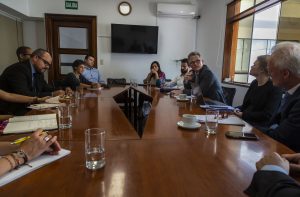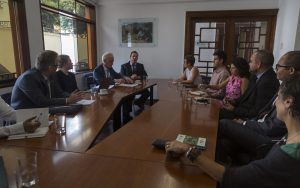The Global Green Growth Institute (GGGI) has partnered with the World Agroforestry Centre (ICRAF) and the Peruvian Society for Environmental Law (SPDA) to support Peru’s efforts to reduce deforestation through an innovative approach that promotes sustainable agroforestry practices and secures land tenure of small farmers in the Amazon.

Representatives from the Government of Norway, GGGI, ICRAF and the SPDA , gathered in Lima to mark the start of a 3-year project whose objective is to provide technical, legal, financial and institutional support to help the Government of Peru implement the Agroforestry Concessions system.
Among those present were Thorstein Wangen, Advisor for Climate and Forestry of the Royal Embassy of Norway concurrently accredited in Peru, Elise Christensen, the Senior Advisor for the Norway International Climate and Forest Initiative (NICFI), Einer Telnes, NORAD Senior Advisor of the Department for Climate, Energy and Environment, as well as Aaron Drayer, the GGGI Peru Country Representative, along with the GGGI teams and project leadership from ICRAF and SPDA.
Agroforestry Concessions are an innovative legal mechanism that seeks to incorporate family farmers in the forest economy by offering those that occupy land in the public forest domain a forty-year usufruct contract over land and tree resources. Their possession is conditioned upon halting deforestation and implementing sustainable land use, including agroforestry.
The project’s expected impacts are to reduce deforestation and carbon emissions in the Peruvian Amazon, promote restoration through agroforestry of previously deforested land, and improve livelihoods of vulnerable small-scale farmers at the forest frontier. It is estimated that Agroforestry Concessions could benefit more than 120,000 families that are currently farming over 1.5 million hectares of forest land.
Successful implementation of Agroforestry Concessions will require the coordination of multiple sectors and governance levels to support the transition of family farmers at deforestation frontiers to engage in sustainable land-use practices that are also financially sound. For this reason, the consortium team will work hand in hand with the Ministry of Agriculture and Irrigation, the Peru Forestry and Wildlife Service and the Ministry of Environment, as well as Amazonian regional governments.
 In the meeting, consortium members and the representatives of the Government of Norway discussed the importance of a multi-stakeholder process to ensure that the Agroforestry Concessions system is successful. Mr. Aaron Drayer indicated how the consortium represents a sum of complementary expertise and approaches to respond to that complexity.
In the meeting, consortium members and the representatives of the Government of Norway discussed the importance of a multi-stakeholder process to ensure that the Agroforestry Concessions system is successful. Mr. Aaron Drayer indicated how the consortium represents a sum of complementary expertise and approaches to respond to that complexity.
The representatives of the Government of Norway highlighted the importance of this new mechanism to help Peru comply with its climate change commitments under the Paris Agreement. Mr. Thorstein Wangen highlighted the importance of engagement with government actors at all levels and connecting the project to public policies. And. Mr. Einer Telnes stressed the importance of this new system to support the Government of Peru towards its zero-deforestation goal. He also emphasized the opportunity for other countries to learn from the Peruvian experience promoting agroforestry, securing land rights and improving farmers’ livelihoods.
Finally, Elise Christensen pointed out that the project’s approach is built upon an in-depth understanding of the complexities of land use at the agricultural frontier and that it focuses on a model that relies more on recognizing land tenure rights for farmers and providing financial incentives than on command and control models.
GGGI and the consortium partners will work closely with the National Forest and Wildlife Service (SERFOR), the Ministry of Agriculture and Irrigation (MINAGRI), the Ministry of the Environment (MINAM) and key regional governments to help build the enabling financial, legal, institutional and technical conditions for the successful implementation of the new Agroforestry Concessions system for family farmers in the Peruvian Amazon.